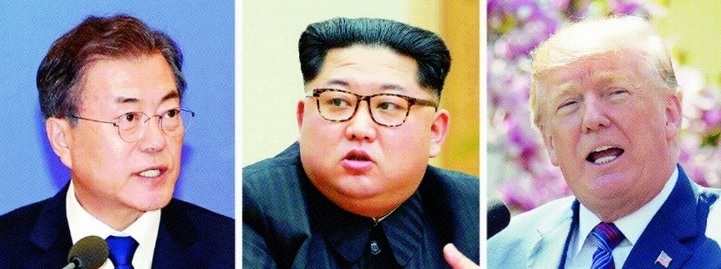 |
|
South Korean President Moon Jae-in, North Korean leader Kim Jong-un and US President Donald Trump
|
KCNA column says end-of-war declaration is in the interests of all Northeast Asian countries
The North Korean media has openly criticized a statement by a group of US experts who argue that North Korea should disclose its list of nuclear weapons and facilities and allow inspections in exchange for a declaration formally ending the Korean War. North Korea’s state-run Korean Central News Agency (KCNA) ran a column titled, “The end of the war isn’t a gift to be given,” on Oct. 2. “Since ending the war is in the interests of all the countries in Northeast Asia, it’s not a present that one party gives to another, and it’s certainly not a bargaining chip that can be traded for our denuclearization measures,” the KCNA said. The KCNA column targeted not the US government or its officials but “so-called American experts on the North Korean issue,” who it said are “uttering absolutely preposterous sophistries to the effect that the US must receive not only the disclosure and inspection of North Korea’s nuclear plans but also the closure of the Yongbyon nuclear complex and missile facilities in exchange for supporting an end-of-war declaration.” “Ending the war is a matter that ought to have already been dealt with half a century before, according to the ceasefire agreement. This is the most fundamental and primary step that must be taken to establish a peace regime on the Korean Peninsula and reset North Korea-US relations, as the US has also agreed to do.” KCNA avoids targeting US government or leadership It’s noteworthy that the KCNA leveled its criticism at “so-called American experts on the North Korean issue” rather than directly targeting the US administration. This appears to reflect a diplomatic attempt to avoid a confrontation with the US government, given the priority of arranging a fourth visit to North Korea by US Secretary of State Mike Pompeo and a second North Korea-US summit. This also appears to explain why the column did not list a high-ranking figure connected with negotiations with the US as its author nor take the form of a “statement by the Foreign Ministry.” In effect, this was a low-level complaint. The KCNA also said, “Since ending the war is in the interests of all the countries in Northeast Asia, it’s not a present that one party gives to another, [. . .] it’s certainly not a bargaining chip that can be traded for our denuclearization measures.” Ending Korean War originally the Americans’ idea Furthermore, the KCNA emphasized that the end-of-war declaration had originally been the Americans’ idea: “In fact, ending the war was an issue that was brought up first by the US more than ten years ago, during the administration of George W. Bush. [. . .] This is expressed in the Declaration for Advancing Inter-Korean Relations and Peace and Prosperity adopted on Oct. 4, 2007, and the Panmunjom Declaration for Peace, Prosperity and Unification of the Korean Peninsula adopted this past Apr. 27. [. . .] This is a matter on which other parties, including the US, have shown more enthusiasm. [. . .] This is a step that ought to have already been taken more than 60 years ago.” Since North Korea and the US agreed to reset their relations in the joint statement adopted in Singapore on June 12, the KCNA pointed out, “it’s only natural to bring an end to our relationship as belligerents.” The KCNA also said that North Korean leader Kim Jong-un had “expressed his willingness to continue taking additional measures, such as permanently shutting down the Yongbyon nuclear complex, if the US takes corresponding measures” in the joint statement that he adopted with South Korean President Moon Jae-in in Pyongyang in September. The KCNA underlined that the Yongbyon nuclear complex, which North Korea has agreed to shut down when the conditions are right, is “a key facility, the very heart of our nuclear plans, as the US and the rest of the world have acknowledged.” “While we have continued to take meaningful and major steps to implement the North Korea-US summit joint statement, the US is still chanting its old mantra of toughening pressure and sanctions on us and attempting to use those sanctions to break our will. If the US is genuinely interested in resolving the nuclear issue on the Korean Peninsula, it should engage in problem solving with a proper understanding of the historical roots and the true nature of the occurrence of the nuclear issue on the Korean Peninsula,” the KCNA said. By Noh Ji-won, staff reporter, and Lee Je-hun, senior staff writer Please direct comments or questions to [english@hani.co.kr]






